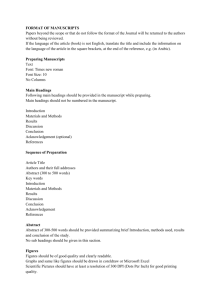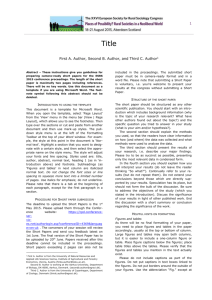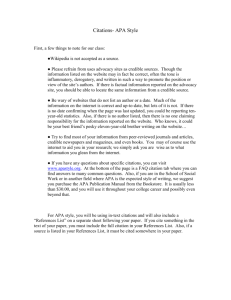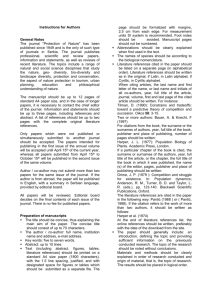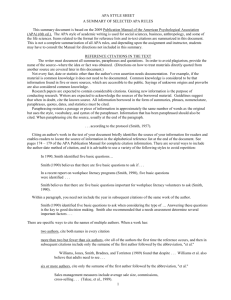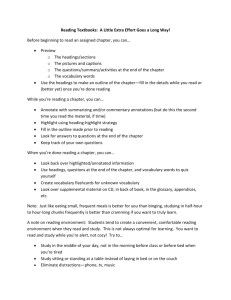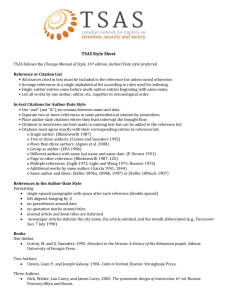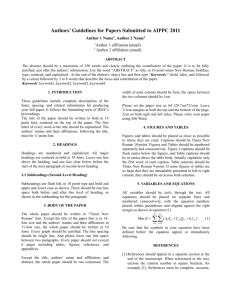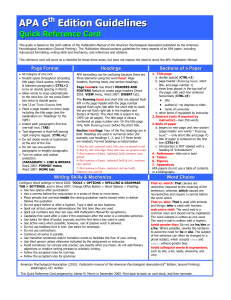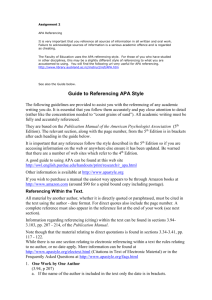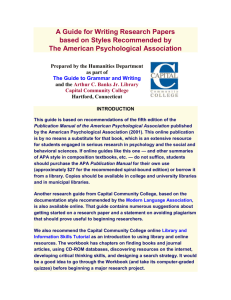INNOQUAL Manuscript and Submission Guidelines
advertisement
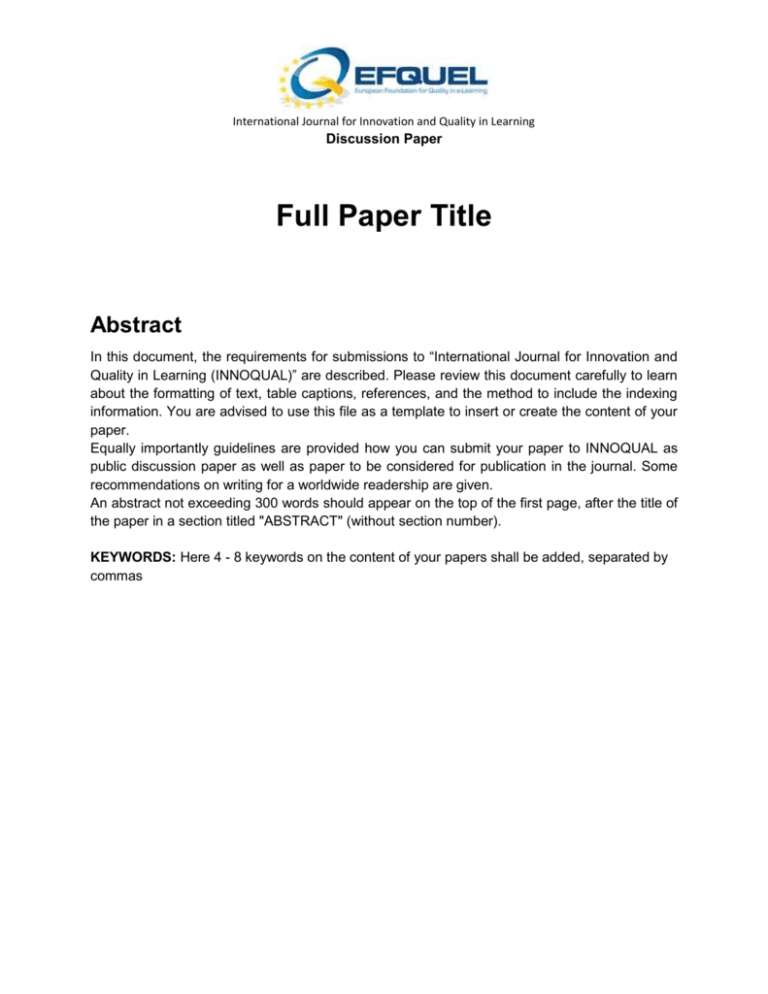
International Journal for Innovation and Quality in Learning Discussion Paper Full Paper Title Abstract In this document, the requirements for submissions to “International Journal for Innovation and Quality in Learning (INNOQUAL)” are described. Please review this document carefully to learn about the formatting of text, table captions, references, and the method to include the indexing information. You are advised to use this file as a template to insert or create the content of your paper. Equally importantly guidelines are provided how you can submit your paper to INNOQUAL as public discussion paper as well as paper to be considered for publication in the journal. Some recommendations on writing for a worldwide readership are given. An abstract not exceeding 300 words should appear on the top of the first page, after the title of the paper in a section titled "ABSTRACT" (without section number). KEYWORDS: Here 4 - 8 keywords on the content of your papers shall be added, separated by commas International Journal for Innovation and Quality in Learning Discussion Paper 1 Introduction INNOQUAL follows a hybrid peer review model. All submitted papers will be published as open discussion papers, if they meet the technical standards as laid out in this document. The scientific community will be invited to comment on discussion papers. Furthermore a double-blind review with two selected referees will be organised by the INNOQUAL Editorial Board. Two tools are used to put this model into practice: Google docs and an Online Submission System. As author, you have two modalities to submit your paper: 1 Submit your paper as a google doc 2 Submit a word/open office/rtf document The first option is encouraged by the INNOQUAL editorial board, since you will keep control over the open document, receive notifications on comments and the publication process will be quicker. It is a prerequisite to have either a google account or a gmail account in order to submit your paper in this modality. Although this might be conceived as downside, we have not found other wide-spread online document sharing tools with clear control over sharing access and evolved commenting functionality. These guidelines present how to submit a paper without using google docs. It is expected that authors will submit carefully written and proofread material. Careful checking for spelling and grammatical errors should be performed. Papers should be between 4.000 6.000 words or 7 - 11 pages in length. Papers should clearly describe the background of the subject, the authors work, including the methods used, results and concluding discussion on the importance of the work. Papers are to be prepared in English, either American or British as long as consistency is kept throughout the document. Technical terms should be explained unless they may be considered to be known to the readership. All arguments made should be backed up either with empirical evidence or references. 2 Layout A uniform appearance will give INNOQUAL discussion papers and journal readers a visually pleasant read. It is therefore strongly suggested to authors to use the example of this file to construct their papers. All text paragraphs should be single spaced, with first line intended as above. Larger spacing should only be used before and after headings and subheadings as shown in this example. Position and style of headings and subheadings should follow this example. No spaces should be placed between paragraphs. International Journal for Innovation and Quality in Learning Discussion Paper 2.1 Headings and document structure Please follow the numbering and heading style of this document: Abstract no number Introduction 1 Your chapters 2-x Conclusions x+1 (Acknowledgement) x+2 References no number Please assign numbers to subchapters as well as for this subchapter. 2.2 Header and page numbers Authors are asked to not replace the logo in the document header. It is not necessary to assign page numbers. 2.3 Fonts and alignment of text Papers should use 11-point Arial font. The styles available are bold, italic and underlined. It is recommended that text in figures should not smaller than 10-point font size. The text should be justified (not left aligned). 2.4 Tables and Figures Figure captions and table headings should be sufficient to explain the figure or table without needing to refer to the text. Figures and tables not cited in the text should not be presented. The following is an example for Table 1. Table column 1 Table column 2 Table column 3 Row 1 12 a Row 2 34 b Row 3 56 c Row 4 78 d Table 1 Title of the Table International Journal for Innovation and Quality in Learning Discussion Paper Tables and figures should be placed close after their first reference in the text. All figures and tables should be numbered with Arabic numerals. Table headings should be centred below the tables. Figure captions should be centred below the figures as shown in Figure 1. Figure 1 INNOQUAL Review Process 4 Steps towards Submitting an INNOQUAL Discussion Paper INNOQUAL follows a hybrid review model in which all submissions meeting the technical standards will be published as online discussion papers. INNOQUAL discussion papers will be published in an electronic format as google docs. At a later stage, your paper will be converted into Portable Document Format (PDF). Even if your paper has not been accepted by the INNOQUAL editors, it will stay online at our website http://innoqual.efquel.org/discussion-paper/ The below text will guide you through the steps how to make your paper a discussion paper. Nevertheless, make sure to also read the chapter four as to guarantee that your papers is eligible for publication in the INNOQUAL journal. International Journal for Innovation and Quality in Learning Discussion Paper 3.1 Using this Document as a Formatting Template Please save this file as template on your local disc. Subsequently copy the document to compose your paper. 3.2 Steps towards INNOQUAL Publication - Registration as Author INNOQUAL is published using the Open Journal System OJS after the public discussion and recommendations by our reviewers, you are asked to create a user account and password here: http://papers.efquel.org/index.php/innoqual/user/register This will allow the INNOQUAL team the access your contact data and affiliation as authors. Figure 8 Filling in the registration form It is recommended to fill in all form fields, since the information will be used for later publication, if your paper has been accepted. You will be able to keep track with the review process and you only need to insert your details once, which is relevant for potential other submissions. International Journal for Innovation and Quality in Learning Discussion Paper Figure 9 Tell the platform that you are a paper author 3.3 Uploading your Paper You can also indicate that you will be a journal reader (hence receiving notifications on publications) or apply as INNOQUAL reviewer. Now, you are ready to “submit”. Login with at http://papers.efquel.org/index.php/innoqual/ and select “New Submission” on the right hand side bar”. Figure 10 Select “New Submission” from your sidebar as soon as logged in From there on you will be guided through the submission procedure in 5 tabs. International Journal for Innovation and Quality in Learning Discussion Paper Figure 11 Sharing the URL to your discussion paper You will be asked to upload your paper. Please upload a word/open office/rtf document version of your paper as displayed online. 4 During the review process and information on publication Authors are invited to follow up with the discussion, comment on public comments as soon as your papers has been shared at http://innoqual.efquel.org/discussion-paper/ Guidelines how to do so can be found online. You are more than welcome to promote the list of current discussion papers through social media. For all Twitter users, please use the hashtag #INNOQUAL . Reviewers are encouraged to take public comments into account when advising the INNOQUAL editors on the inclusion of your paper for an INNOQUAL issue. 5 Conclusion Conclusions of your paper should state concisely the most important propositions of the paper as well as the author’s views of the practical implications of the results. 6 Acknowledgements A short acknowledgement section can be written between the conclusion and the references. Sponsorship and financial support acknowledgments should be included here. Acknowledging the contributions of other colleagues who are not included in the authorship of International Journal for Innovation and Quality in Learning Discussion Paper this paper is also added in this section. If no acknowledgement is necessary, this section should not appear in the paper. References [and In-text Citations] Proper references must be included throughout the text and the list of references must be provided in this section. The references inserted in the text and the list of references must be done following one consistent scientific citation and bibliography style throughout the text. INNOQUAL recommends to use the style guide of the American Psychological Association (APA style) for in-text citations and the list of references. Some examples for citations in the main body, appendices, tables and figures shall be given here. Works by a single author are cited “Smith (2005) argues that...” or “.. as previously shown (Smith, 2005)”. Works by multiple authors are cited with all names the first time the reference occurs, e.g. “Smith, Miller, and Johns (2010) demonstrated...” or “... as argued previously (Smith, Miller, and Johns, 2010)”. Subsequently, only the surname of the first other is cited, for example “Smith et al. (2010) proved...”. For two authors an ampersand ‘&’ is used. Referencing websites: Website references must also be reported. URLs should be ‘clickable’. Include retrieval dates only if the source material is likely to change over time (e.g. wikis or blogs). APA provides an excellent style guide on references retrieved from the internet. List all cited references (including citations in tables, figures and appendices) in alphabetical order according to the first-named author. The titles of papers, patents and books or monograph chapters and the initial and final page numbers are to be included. A concise list of examples for journal papers, book/monograph sections or chapters, and conference proceedings is provided by Simon Fraser University Library (n.d.). Please added spaces after each references as below. European Foundation for Quality in e-Learning. (2011). Mainstreaming Open Educational Practices - Recommendations for Policy. Retrieved from http://efquel.org/wpcontent/uploads/2012/12/Open-Learning-Recognition.pdf Simon Fraser University Library Citation Guide: APA (6th ed., 2010). (n.d.). Retrieved from http://www.library.cornell.edu/resrch/citmanage/apa
